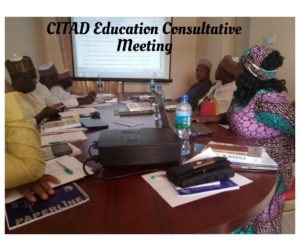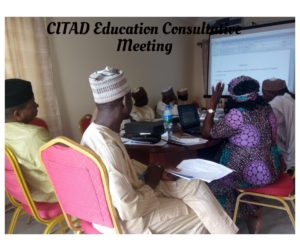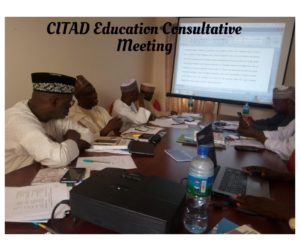Report a Project Radio Program
On the 12th of September, 2019 the Centre for Information Technology and Development conducted its weekly Radio Program (41st edition, the 2nd in this quarter) title Report a Project which is been aired every Thursday at Freedom Radio, Duse between 5 to 6pm with Ali Sabo of the Centre and Nura Garba Tsanyawa of Freedom Radio. The program designed specifically to encourage students to report projects that are either abandoned, poorly done or that have elements of corruption on them. And it is also looking at the ways that can be used to fight corruption and ensure transparency in governance.
This week program centred on dangers and hardship abandoned projects are inflicting in the affected communities and the waste of resources associated with it. The presenter of the program discussed on the problems abandoned projects in the communities are bringing to the immediate communities, the waste of resources accompanying it, staggering development in the country and how they are affecting development. The presenter explained to the listeners that for them to change the status quo they must raise their voice and start reporting such kind of bad attitude of politicians to the appropriate agencies and organizations.
While discussing on the issue of abandoned projects in the communities, the presenter reminded the audience about CITAD’s report a project and anti-corruption essay competition which is been conducted bimonthly. He urged the listeners to leverage on this opportunities introduced by CITAD to be reporting such kind of projects in their communities.
Audience Response:
- Yawale Sani Takai: first of all I will say I have been following this program since from its inception to date and you must be commended for doing a job well-done. Secondly, like what you have been saying about tracking budget and reporting abandoned projects, I will say that because of this awareness you are creating a lot of us have started to track government spending in our areas. There is an issue I complained about regarding Marke’s people; they were deceived by one government official who collected their money and promised to construct a borehole for them and refused to do it. Last time Ali Sabo connected me with one of their staff in Kano who asked us to find out the root cause of the problem, where we interviewed the people of the community and took some pictures. My appeal to CITAD is to look into this matter again and see where it can help because up to this time the man did not return the money he collected from the people. And lastly, I want talk about our road in Takai, the road was started since last administration and up till now it has not been completed but we are still following.
- Yusuf Muhammad: my questions are:
- The presenter said that in writing an essay on anti-corruption and abandoned projects it shouldn’t exceed 1000 words, so what will happen if it exceed that?
- As a youth do I have the right to ask why some of the state governments did not make political appointments?
- And lastly, do I have the right to track this year’s budget?
- Aminu Darau: first I want once again thanks CITAD for this program because it is through this program that I complained about our nomadic school which has only one teacher and that problem has been solved, because another teacher has been sent. And secondly, I’m appealing to the state government to come and build us classrooms because the students are taking classes in an open veranda and we have more than 300 students. Finally, we are in lack of drinking water in our village because our people have to travel to neighboring villages before they can get drinking water
- Muttaka Muhammad Musa: I just want make some comments regarding what Ali Sabo discussed. Yes it is good for us youth to be tracking our budget and abandoned projects in our communities and hold our leaders accountable. Then my question is, in the past I have complained about our road from Karfi to Shagu which is not more than 3 kilometer to which we have met with Takai local government chairman regarding the road when we heard that local governments are now accessing their funds directly from federal government but up till now nothing has been done. So my question here is since the local government refuse to do this work can we also send it to the link provided?
- Ya’u Mai Garan Takalmi: I really enjoyed what the presenter discussed, and to the best of my knowledge the most important aspect that we should focus our attention to if we really want fight corruption is to provide jobs for our teeming unemployed youth. And secondly, our road which is under construction that links Sabuwar Takur, Morpol Base and DanMasara, to be sincere it is only morpol base that is benefiting from the road because in our area, Sabuwar Takur the contractor is not doing what he ought to have been doing.
- Muhammad Barangu: I think the best way is to provide jobs for the youths, if government can be able to do this all other problems will be solved.
In all ten calls were received.







